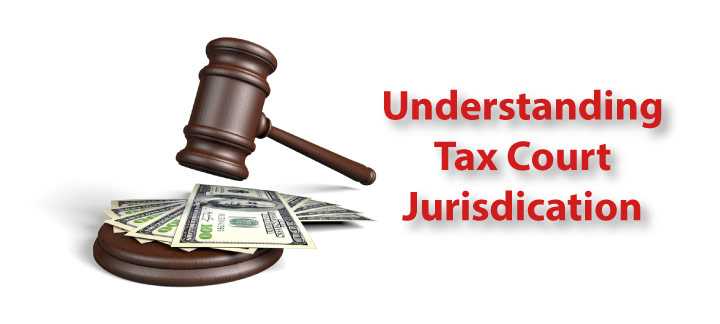General Jurisdiction of the Tax Court
The Tax Court is the most typical forum for the resolution of tax litigation controversies. The Tax Court is an Article I court with limited jurisdiction as expressly conferred by Congress.
Specific Jurisdictional Provisions Related to the Tax Court
The primary jurisdictional provision related to the operation of the Tax Court is found in IRC § 7442. Under this provision, the Tax Court has the ability to:
- redetermine the correct amount of a deficiency;
- issue declaratory judgments as to certain types of tax disputes; and
- decide certain disclosure, administrative costs and partnership actions.
Ability of the Tax Court to Resolve Deficiency Litigation
The Tax Court has jurisdiction to redetermine deficiencies determined by the IRS Commissioner for certain types of taxes. The jurisdiction extends to taxes for which the taxpayer receives a statutory notice of deficiency. When a taxpayer files a petition for redetermination after receiving a statutory notice of deficiency, the Tax Court is conferred jurisdiction over the matter. IRS taxes which may be subject to Tax Court jurisdiction through a statutory notice of deficiency process include the following:
- Income, estate, and gift taxes
- Excess profit taxes
- Miscellaneous excise taxes applied to public charities, private foundations, qualified pension plans, and real estate investment trusts and regulated investment companies.
Jurisdiction of the Tax Court over Refund Actions
The Tax Court may also obtain jurisdiction if the taxpayer files a petition for a refund instead of redetermination of deficiency. Although the filing of a petition for redetermination precludes a taxpayer from proceeding to tax court litigation in the district court or Court of Federal Claims, the reverse is not necessarily true. A taxpayer who files a refund action may still resort to the Tax Court for certain limited situations. If the IRS has issued a statutory notice of deficiency to a taxpayer with pending refund litigation before the hearing in the refund case, IRC § 7422(e) acts to stay the proceedings in that case for 150 days. During the period of the stay, the taxpayer has the ability to file a petition for redetermination in the Tax Court. If the taxpayer makes that election, all further proceedings will thereafter take place in the Tax Court.
Taxable Years Subject to Tax Court Jurisdiction
Under IRC § 6214(b), the Tax Court is authorized to consider facts and circumstances from multiple tax years as necessary to resolve the redetermination of the deficiency as decided by the IRS. This means that the Tax Court can consider tax years for which the statute of limitations has already run if doing so will help the court determine the correct amount of tax. The rationale for this rule is that the Tax Courts “are concerned not with additional assessments for a barred year, but only with review of an earlier computation for the purposes of correctly determining the tax liability for a year barred.” Although the Tax Court has the ability to calculate or consider the correct tax in years barred by the statute of limitations, it is unable to obtain jurisdiction in order to determine the correct amount of assessed tax.
Tax Court Jurisdiction over Joint Returns
Sometimes, in the case of joint returns, the IRS issues separate deficiency notices to each spouse. Spouses who file joint returns are subject to joint and several liability, so the payment of a proposed deficiency by either spouse can have the effect of divesting the Tax Court of jurisdiction over the identical deficiency proposed for the other spouse.
In one famous case, the IRS issued separate deficiency notices to a husband and wife. The wife paid the full amount against her and filed a suit for refund, while the husband filed a petition for redetermination in the Tax Court. The Tenth Circuit rules that once the wife paid the full amount of the deficiency against her, the Tax Court lost jurisdiction over the husband’s action because the common items in the deficiency notice were satisfied by the wife’s payment.
Interest on a Tax Deficiency in Tax Court
Fortunately for the taxpayer, interest does not accrue on a deficiency in Tax Court. Interest can only accrue on an underpayment, and a deficiency is not considered an underpayment until it is assessable. A deficiency is not considered assessable until the Tax Court’s decision becomes final. Under IRC § 7481(c), the Tax Court has the jurisdiction to resolve disputes regarding calculation of the correct amount of deficiency interest applying to a deficiency redetermined by the Tax Court. The rules for this type of jurisdiction are as follows: 1) the deficiency amount determined by the Tax Court must have been assessed by the IRS Commissioner under IRC § 6212; 2) the taxpayer must have paid the full amount of the deficiency; and 3) a petition must be filled with the Tax Court within one year after the date on which the Tax Court rendered a final decision. When these factors are present, the Tax Court has the ability to reopen the case to determine whether the taxpayer has made an overpayment on the interest on the redetermined deficiency amount.
How a Tax Attorney Can Help with Your Tax Litigation
If you are contemplating a deficiency litigation, then you must consult with an experienced tax attorney. San Diego Tax Attorney William D. Hartsock has been successfully helping clients with tax issues since the early 1980s. Mr. Hartsock offers free consultations with the full benefit and protections of attorney client privilege to help people clearly understand their situation and options based on the circumstances of their case. To schedule your free consultation simply fill out the contact form found on this page, or call (858) 481-4844.



Comments (0)